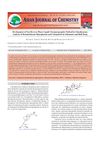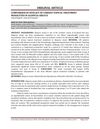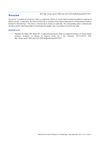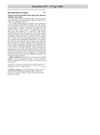 January 2021 in “Advances in health sciences research/Advances in Health Sciences Research”
January 2021 in “Advances in health sciences research/Advances in Health Sciences Research” Two siblings with gray patch tinea capitis were successfully treated after identifying risk factors.

Some TikTok hair loss remedies like rosemary oil, onion juice, and garlic gel show promise, but more research is needed and they might delay proper treatment.

Topical corticosteroid treatment showed no significant difference from placebo in treating alopecia areata in children.
 48 citations,
October 1996 in “Dermatologic clinics”
48 citations,
October 1996 in “Dermatologic clinics” Some treatments can help with hair regrowth in alopecia areata, but results vary and long-term use is often needed without changing the disease's outcome.
 5 citations,
January 2014 in “Asian Journal of Chemistry”
5 citations,
January 2014 in “Asian Journal of Chemistry” Researchers developed a quick and reliable method to test for betamethasone dipropionate and calcipotriol in ointments and drugs.
 15 citations,
May 2017 in “Journal of Dermatological Treatment”
15 citations,
May 2017 in “Journal of Dermatological Treatment” Latanoprost works better for hair growth, and combining it with betamethasone valerate is most effective.
 1 citations,
February 2015 in “Journal of evolution of medical and dental sciences”
1 citations,
February 2015 in “Journal of evolution of medical and dental sciences” 0.05% Betamethasone Dipropionate is the most effective topical treatment for alopecia areata.
 August 2017 in “International journal of research in dermatology”
August 2017 in “International journal of research in dermatology” 0.05% betamethasone dipropionate is the most effective treatment for mild alopecia areata.
 26 citations,
March 2014 in “Journal of cutaneous medicine and surgery”
26 citations,
March 2014 in “Journal of cutaneous medicine and surgery” Topical vitamin D is useful for some skin conditions but not effective for others, and more research is needed.
 April 2003 in “Reactions Weekly”
April 2003 in “Reactions Weekly” A woman developed skin irritation from treatments for hair loss, showing allergies to both minoxidil and saw palmetto solutions.

Combining epinephrine with a steroid may help regrow hair in severe alopecia areata cases.
 128 citations,
January 2001 in “American Journal of Clinical Dermatology”
128 citations,
January 2001 in “American Journal of Clinical Dermatology” Coal tar shampoos, salicylic acid, and topical corticosteroids are effective for scalp psoriasis, with Vitamin D3 analogues also showing benefits; severe cases may require stronger medication with more risks.
 April 2024 in “Medical & clinical research”
April 2024 in “Medical & clinical research” More research is needed to find the best long-term treatments for Alopecia Areata.
 January 1987 in “Side effects of drugs annual”
January 1987 in “Side effects of drugs annual” Some cosmetics and dermatological drugs can cause allergic reactions and side effects, like skin irritation and systemic issues.
 72 citations,
July 2014 in “American journal of clinical dermatology”
72 citations,
July 2014 in “American journal of clinical dermatology” Some treatments, like corticosteroids and sensitizing agents, can help with alopecia areata, but more high-quality research is needed.
 67 citations,
January 2013 in “Indian Journal of Dermatology, Venereology and Leprology”
67 citations,
January 2013 in “Indian Journal of Dermatology, Venereology and Leprology” The document concludes that alopecia areata is an autoimmune disease without a definitive cure, but treatments like corticosteroids are commonly used.
 53 citations,
October 1978 in “Archives of dermatology”
53 citations,
October 1978 in “Archives of dermatology” Zinc supplements can resolve skin issues caused by zinc deficiency.
 50 citations,
March 2000 in “American Journal of Clinical Dermatology”
50 citations,
March 2000 in “American Journal of Clinical Dermatology” Alopecia Areata has no guaranteed treatment for hair regrowth, but options like corticosteroids and minoxidil are used, with future research focusing on genetic and immune therapies.
 49 citations,
November 1992 in “Archives of dermatology”
49 citations,
November 1992 in “Archives of dermatology” Different treatments for alopecia areata have varying success rates and side effects; intralesional steroids are most effective.
 41 citations,
November 1993 in “Journal of The American Academy of Dermatology”
41 citations,
November 1993 in “Journal of The American Academy of Dermatology” DPCP helps treat severe hair loss, but 5% minoxidil doesn't add benefits.
 40 citations,
December 2016 in “Journal of Dermatological Treatment”
40 citations,
December 2016 in “Journal of Dermatological Treatment” JAK inhibitors show promise for treating skin and hair disorders but need more research on long-term safety and effectiveness.
 25 citations,
May 2009 in “International Journal of Dermatology”
25 citations,
May 2009 in “International Journal of Dermatology” About one-third of dermatology patients in Ankara, Turkey use unconventional treatments for skin issues.
 24 citations,
January 2020 in “International Journal of Molecular Sciences”
24 citations,
January 2020 in “International Journal of Molecular Sciences” Some plants with flavonoids may help treat hair loss and promote hair growth.
 20 citations,
January 2012 in “International journal of trichology”
20 citations,
January 2012 in “International journal of trichology” Steroids are the best treatment for Alopecia Areata with few side effects.
 4 citations,
September 2011 in “Expert Review of Dermatology”
4 citations,
September 2011 in “Expert Review of Dermatology” Various treatments exist for alopecia areata, but none are completely satisfactory; choice depends on age, disease extent, and preference.
 3 citations,
March 2022 in “Korean Journal of Family Medicine”
3 citations,
March 2022 in “Korean Journal of Family Medicine” Doctors should consider SLE in males even if antinuclear antibody tests are negative.
 3 citations,
August 2021 in “Cutis”
3 citations,
August 2021 in “Cutis” Some alternative medicine treatments might work for skin conditions, but their effectiveness and safety differ a lot.
 1 citations,
May 2017 in “InTech eBooks”
1 citations,
May 2017 in “InTech eBooks” Some natural remedies may help with hair regrowth, but more research is needed to confirm their effectiveness and safety.
 February 2024 in “International journal of biology, pharmacy and allied sciences”
February 2024 in “International journal of biology, pharmacy and allied sciences” Plant-based treatments can effectively and safely treat hair loss.
 August 2023 in “Vittalle”
August 2023 in “Vittalle” Mais estudos são necessários para garantir a eficácia e qualidade dos tratamentos de alopecia com plantas medicinais.






























